- Home
- Simon Kernick
Relentless: A Novel Page 3
Relentless: A Novel Read online
Page 3
My mouth felt dry. Something wasn’t right. The silence felt heavy and unnatural. I couldn’t even hear the sound of traffic outside. Then I remembered. The walls here were very well insulated so that the academics could get on with their work in peace, unsullied by the constant racket of urban life the rest of us have to put up with.
Turning round, I went over to the door that led into the department’s library. The lights were off and it looked empty. I turned the handle and stepped inside, shutting the door quietly behind me.
It was a big room, probably fifty feet square, with a walkway running down the middle from the door to a bank of windows at the far end. About a third of the space was taken up by large rectangular worktables, some with PCs on them, all of them empty. There were no bags or coats to suggest that anyone was around, no books out and opened, and the screens on the computers were all blank. The tables gave way to lines of floor-to-ceiling shelves full of books that ran left to right and were bisected by the walkway, and which blocked out much of the natural light, giving the room that gloomy feel you often get in libraries. There was a line of further tables at the very end of the room by the windows. They too were empty.
This time I did call out. ‘Hello, is anyone here?’
No answer.
I pulled the phone from my pocket and speed-dialled Kathy’s mobile yet again. At the same time I walked over towards the lines of bookshelves filled with political tomes that took up much of the space ahead of me. I was unsurprised but increasingly unnerved when it went to message again. If she wasn’t here, where on earth was she?
I had to keep calm, I knew that. Maybe she’d left for the day and forgotten to switch the phone on. But of course that meant she might already have got home and run into whoever it was who was rifling through our belongings. Whichever way I viewed it, things were not looking good.
As I pocketed the mobile, something on the floor caught my eye. Just in front of one of the shelves. Difficult to see against the deep green of the carpet.
A stain, no more than a couple of inches across.
I swallowed hard, bent down, dipped a finger in it and flinched at its wetness. I inspected the upturned fingertip. There was no doubt about it. No doubt at all.
Blood.
And it was fresh.
Slowly my gaze moved along the carpet. There was a second stain, smaller than the first, then another. Thick droplets of blood. A trail.
My body stiffened. Please no. Please not Kathy. Not my wife, a woman who’s never hurt anyone. Anything but that. ‘Keep calm,’ I said, aloud this time. ‘Don’t panic.’
I looked up and saw a door facing me at the end of the bookshelf, fifteen feet away. It was about a foot or so ajar, and all I could see beyond it was darkness. I looked again at the carpet. The blood trail ran right along it towards the door. I stared at it, trying to detect movement.
My mobile started ringing. No, it wasn’t mine. It was someone else’s. A different ringtone. Mine was pretty normal; this was more jaunty. Annoyingly so. And it was coming from beyond the door.
Then it stopped.
The silence was so heavy that I could almost feel it weighing down on me. My instincts told me to run, to get the hell out of there. But what if it was Kathy who was bleeding in there? It wasn’t her mobile, I knew that. But that didn’t mean it wasn’t her behind the door.
I took a step forward. Halted. I was unarmed. What on earth was I going to do if I was confronted by someone? I needed to get help. Now.
The door flew open and a tall figure dressed in a sky-blue, paint-flecked boiler suit, black balaclava and gloves stood in front of me. He held a knife in front of him. It had a yellow handle and a long curved blade, similar to that of a filleting knife. The end of it was stained dark with blood.
For a split second neither of us moved, each studying the other. Only five yards apart. I didn’t have time for fear. Instead, I experienced a single, nightmarish jolt of shock that froze me to the spot. And then suddenly he exploded out of the door, coming at me with huge purposeful strides, the knife raised high in a killing arc.
Instinctively I grabbed a book from the nearest shelf and flung it at him, then turned and ran, but in my panic I went the wrong way and found myself facing the windows at the far end of the room rather than the door. There was no time to double back, he was right behind me, so I took off up the walkway in the direction of the windows, the sound of his breathing and the rhythmic patter of his boots clattering on the laminated plastic of the walkway spurring me on.
There was a wooden trolley full of books next to one of the shelves and I grabbed the end of it as I passed and yanked it out into the walkway behind me. I heard him clatter into it, and the sound of books falling to the floor, then him knocking it to one side, the delay to his progress giving me perhaps an extra second and a half. I didn’t dare look round; I was too busy concentrating on getting to the windows. I could see that they had handles and guessed – prayed – that they opened outwards. The library was high up, twenty feet above the ground at least, maybe more. It didn’t matter. I had to get out.
I ran between two round reading tables in front of the windows and pulled desperately at the first latch I came to. It didn’t move. The damn thing was locked. I could hear my pursuer’s footfalls gaining. I swung round and he was there, right in front of me, five feet away and still running, the bloodied knife thrusting forward at waist height. Ready to fillet me.
I heard myself cry out in fear, but at the same time I had enough instinct for survival to grab the nearest chair and charge into him, forcing its legs into his face and upper body as I tried to get him off balance. He stumbled backwards, lifting his arms defensively, and this gave me time to move into a more open space. Out of the corner of my eye I saw an open door marked toilets. A potential escape route, but there was no time to give it much thought as I pressed my advantage, advancing fast and thrusting the chair at him once again. But this time he was ready. He jumped nimbly to one side and grabbed one of the legs, twisting it away from me.
We wrestled with the chair for several more seconds, but I was now more exposed and he suddenly lashed out with the knife, just catching the exposed flesh of my arm below the elbow. I felt a sharp burning sensation but no pain. My adrenalin was pumping too hard for that. I gritted my teeth, saw the thin gash he’d made through the material of my shirt bubble up with blood, and then I was having to dodge him as the knife skimmed through the air again. It caught me in the middle of my cheek as I twisted my face away. Another burning sensation, and I could feel a drop of blood running down onto my neck.
The reality of what was happening now hit me. I was fighting for my life. This man was trying to kill me, and all the time the room was deathly silent.
He tried to get his leg round the back of mine so he could trip me up, then yanked at the chair again and drove the knife at my midriff. This time as I twisted away, banging hard against the nearest bookshelf, I let the chair go, giving it as much of a shove as I could manage under the circumstances. I don’t think he was expecting that because he stumbled backwards and almost lost his footing.
That was my chance. I turned and ran like I’ve never run before, aiming straight at the door marked toilets, knowing that if I fucked this up, I was dead. I have a morbid fear of being stabbed to death. Of being opened up by a hot blade and watching my blood and my life ebb away, unable to do anything about it. It’s been with me ever since a guy we went to school with was fatally knifed in a local nightclub a decade ago. Two thrusts, both straight to the heart. The doormen threw him out, not realizing what had happened, and he died on the pavement outside. This was the fate that awaited me. A lonely, terrifying, messy death.
As I moved through the open door, I slammed it shut behind me. My mind registered two more doors: one to the left, one opposite. I took the one opposite. The men’s. Behind me, the main door flew open again. He was still on my tail.
I charged into the men’s, saw a row of stalls directly
in front of me, swung right, slipping on the tiled floor but somehow keeping my balance, and kept going round the corner where there were a number of individual urinals arranged against the wall in a rough semicircle. Directly above one was a narrow window, maybe eighteen inches high and three feet across. There was an ancient latch at the bottom of it, the paint almost entirely peeled off. I ran forward and jumped up onto the urinal, flicking the latch off its guard in one movement, and using both palms to knock open the window. Then I was scrambling through, head-first, my legs flailing. As my upper body lurched out into the open air, I could see a flat roof six or seven feet below me where the building had been given a single-storey extension. Safety. I was halfway out, arms outstretched, already prepared for impact, when I heard the scuff of his boots from inside and felt him grab my leg and pull up the material of my jeans in an effort to expose my calf. As the blade touched my flesh but before he could make an incision, I lashed out with the other leg and could tell by the impact that I’d caught him in the face. For the first time I heard him cry out, and I kicked again, like a donkey, then put the flats of both hands against the outside wall and launched myself forward into thin air, as if making a championship dive.
The roof shot up to meet me and I hit it in an unsteady handstand, pain shooting up my wrists. My legs hovered precariously in the air then made a rapid descent, and I ended up somersaulting over, the roof’s material digging into my scalp. It didn’t even strike me to look back, to check whether my assailant was coming or not. I half-crawled, half-ran, over to the edge of the building and, using my hands as a pivot, swung myself over and slid down the wall, jumping the last couple of feet to the ground.
I was in a small paved area enclosed by a brick wall some ten feet high. In front of the wall were two lines of car-sized green wheelie bins, the majority of them overflowing with rubbish. There was a strong smell of refuse. Beyond the wall, I could hear the sound of a car coming past. Freedom.
I stood where I was for several seconds, panting heavily, then heard movement on the roof above me. It was like being trapped in a nightmare. The bastard was still coming.
Summoning up my remaining strength, I ran between the lines of wheelie bins and tried to haul myself up on one that had been positioned adjacent to the wall. I failed with my first attempt. I’m no longer as fit as I used to be. My gym membership lapsed three years ago, and now the occasional game of tennis in the summer is my only real exercise. Bizarrely, as I went to try it a second time, I made a vow to renew the gym membership if ever my life returned to normal.
This time, with a grunt of exertion, I managed it, flopping onto the bin’s plastic top on my belly before struggling to my feet, pulling myself up the last couple of feet to the top of the wall and scrambling over, unable to see my pursuer in the half-second timeframe I had before the view behind me disappeared.
I hit the pavement feet-first and saw that I was in an unfamiliar residential street of terraced housing. A car came past but the driver didn’t seem to notice me. I’d lost my bearings, having never exited the university this way before. All I knew was that I was a long way from my car.
Panting loudly, I ran across the road and headed back in the direction of where I thought the car park was situated. I must have looked a sight. I could feel the blood from the wound on my face now running down onto the collar of my shirt, staining it. The arm wound, meanwhile, was bleeding even more heavily. It burned, as if someone was inserting white hot needles into the skin, and I looked at it for a moment as I half-staggered, half-ran down the street, my mouth open, sucking in air. For the first time, I felt sick. What was happening to me? What had I done to deserve this?
An attractive woman of about thirty in a long gypsy skirt and halter top stepped out of her house, took one look at me and immediately rushed back in again, shutting the door behind her. This was London. The place where it’s always best to mind your own business and step away from trouble. A friend of Kathy’s had been mugged once, about five years ago, outside Oval tube station at four o’clock in the afternoon. She’d tried to hold onto her handbag and her two attackers had kicked her to the ground and spent several long minutes wrestling it from her while raining down resistance-sapping blows. During that time she estimated that some fifty people walked past. Most had hurried away. A couple slowed down to get a better look. No-one had intervened. Kathy had sworn that had she been one of those passing she would have done something. ‘I wouldn’t have been able to live with myself if I hadn’t,’ she’d told me. ‘If you turn your back, it’s the same as admitting that you’ve been defeated, and I could never do that.’ This was typical of Kathy. She was a woman with principles, a woman who cared. But where was she now? And, more importantly, had it been her blood on the carpet back in the library with that madman?
I had to locate her. Get to her soon.
Still running, I rummaged in my pocket for the phone. Please answer this time. Please.
Another car came past. This time the driver slowed, and as our eyes met, his widened dramatically. I kept going, ignoring the pain in my lungs. Behind me I heard the car stopping, and him getting out.
‘Mate!’ he shouted. ‘Mate! Are you all right?’
I didn’t want to speak to him. I didn’t want to speak to anyone other than my wife. I had to get to her. I tugged out the phone, but heard the man’s footsteps coming behind me.
No, not again. Was he one of them? The bastards seemed to be everywhere. In my home – my fucking home. At my wife’s work.
I accelerated, and as I came to a crossroads I stumbled into the road, the phone in my hand, ignoring the shouts of the man behind me. I heard the roar of a car to my right. A blast of a horn, and then an angry screech of tyres. Out of the corner of my eye I saw a huge white shape bearing down on me and I knew I was going to get run over. I could just make out the blue lights on its roof and then it hit me with a bang that was all but drowned out by the sound of the skid. I tumbled over the bonnet, bounced off it once, then seemed to slide off the other side, falling onto the road in a fetal roll a few feet from the front passenger door.
The door opened and I came face to face with a pair of well-polished black police-issue boots. ‘Hello hello hello,’ I said, and then, for some wholly inexplicable reason, I started laughing, the movement making my body sear with a dozen different pains.
For the moment, I could stop running, and I felt a surge of relief that lasted as long as it took for the police officer to bend down, pull my arms painfully round behind my back, and tell me I was under arrest on suspicion of murder.
4
DI Mike Bolt’s team of National Crime Squad detectives operated out of the middle third of a nondescript 1970s two-storey greybrick building with a corrugated-iron roof that made a terrible racket whenever it rained heavily. It was situated on a bland, sprawling industrial estate just off the A4 in Hayes, and a couple of miles east of Heathrow airport. The sign in the window said whitehouse design consultancy, and neither of the companies on either side of them – a printer’s and a recruitment agency – had any idea that the men and women coming out of the front door were plainclothes police officers. They kept themselves to themselves and retained a low profile, which was the way to operate when you were involved in the murky world of organized crime.
Today, however, the only occupant of Whitehouse Design Consultancy was Bolt himself, and the crime he was working on had nothing to do with the organized variety, at least on the surface of it. It also might not have been an actual crime. At that moment in time, it was difficult to tell.
The case was the apparent suicide of a senior member of the judiciary. Because of the victim’s high profile, and the fact that his suicide note had been typed and unsigned, a decision had been taken at the highest level to launch a thorough investigation into the circumstances surrounding his death. And because Bolt’s team had just come off a very successful case in which they’d broken up a major money-laundering ring, they’d been chosen to carry it out.
So, rather than enjoying the fishing trip with a couple of old Flying Squad buddies that had been planned for months, Bolt was instead spending his Saturday afternoon sitting in his drab open-plan office, with a view that took in a power tool wholesaler’s and a vegetable oil importer’s warehouse, poring over the initial autopsy report which had been faxed through an hour earlier. There was a lot of crap about body temperatures, chemicals and stomach contents, but the gist of the report was that the victim had died between 8 p.m. and 4 a.m. two nights earlier, the cause of death an overdose of dilantin, a type of sleeping pill. Further tests were needed to confirm how the drug had been administered, but mild bruising on the underside of the victim’s left arm suggested that he had probably injected it.
Bolt sighed and sat back in his chair. None of this told him much. His first instinct when the team had been assigned the case the previous morning, after the victim’s maid had discovered the body, was that it had indeed been a suicide. The reasons for this were as follows. One, there were no signs of forced entry into the Mayfair townhouse where the body had been found, and it was a secure building, with strong locks on the front door, no rear access unless you traipsed through someone else’s house first, and a sophisticated alarm system with panic buttons in every room. Two, there were no signs of a struggle. The victim was lying on his side in bed with the covers off, clad in fashionable silk pyjamas and a towelling robe, his features peaceful. It was a perfectly natural position to die in. As well as this, everything in the room looked untouched. There were no overturned lamps or drawers pulled out, nothing that would invite suspicion.
What was bugging the people on high, though, was the suicide note. The fact that it was typed rather than handwritten was one bone of contention. Apparently, the victim was particularly proud of what one fellow judge had described as, quote, ‘the curved, flourishing style of his handwriting’. Another of the victim’s former colleagues had suggested that the letter, at only two lines long, was too short. The dead man was a methodical thinker, which probably had something to do with his legal background. He liked to seek out and provide explanations for events, and would, they argued, have wanted to give the public something a bit more substantial than the fact that he couldn’t take the pain of living. Finally, the letter was unsigned, which had led to some questioning its veracity.

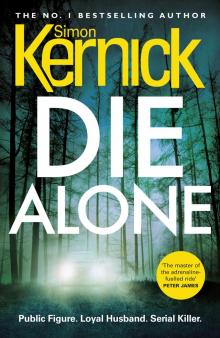 Die Alone
Die Alone Deadline
Deadline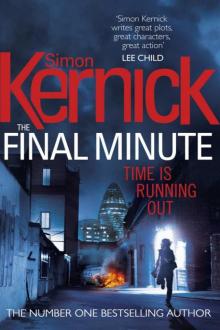 The Final Minute
The Final Minute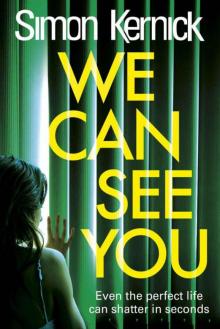 We Can See You
We Can See You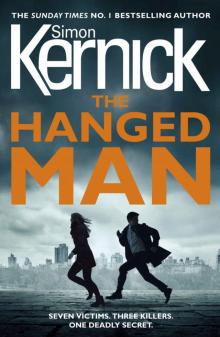 The Hanged Man (Bone Field 2)
The Hanged Man (Bone Field 2)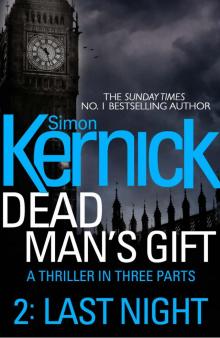 Dead Man's Gift 02 - Last Night
Dead Man's Gift 02 - Last Night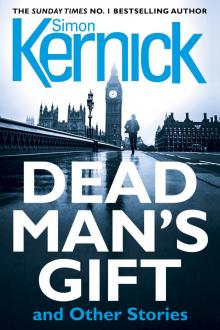 Dead Man's Gift and Other Stories
Dead Man's Gift and Other Stories A Good Day To Die
A Good Day To Die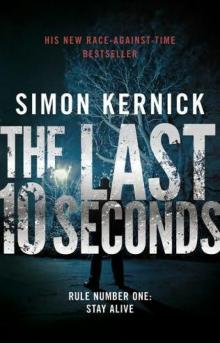 The Last 10 Seconds
The Last 10 Seconds The Murder Exchange
The Murder Exchange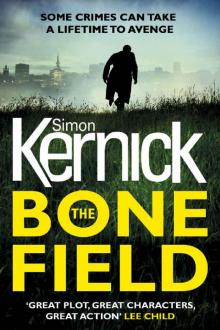 The Bone Field
The Bone Field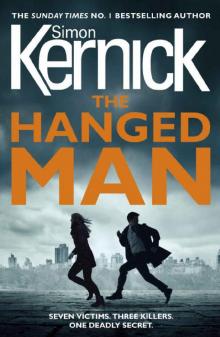 The Hanged Man
The Hanged Man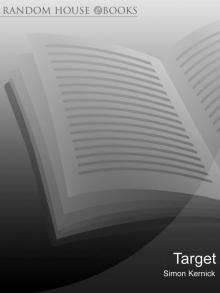 Target
Target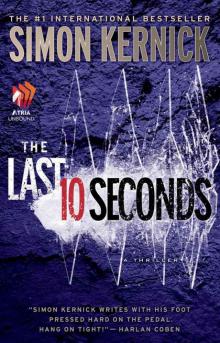 The Last 10 Seconds: A Novel
The Last 10 Seconds: A Novel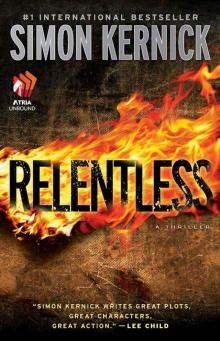 Relentless: A Novel
Relentless: A Novel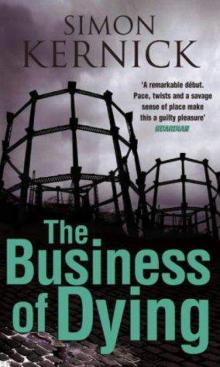 The Business Of Dying
The Business Of Dying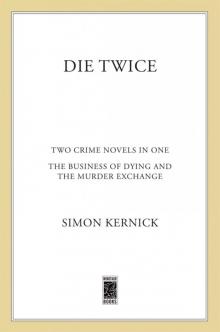 Die Twice
Die Twice Flytrap
Flytrap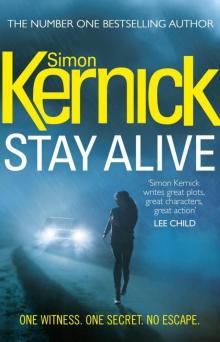 Stay Alive
Stay Alive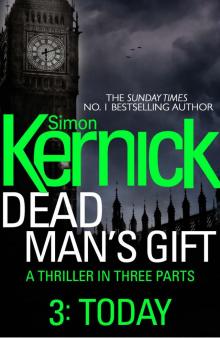 Dead Man's Gift 03 - Today
Dead Man's Gift 03 - Today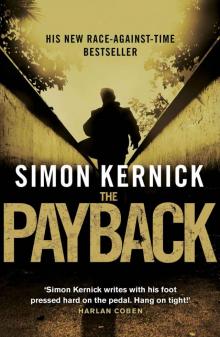 The Payback
The Payback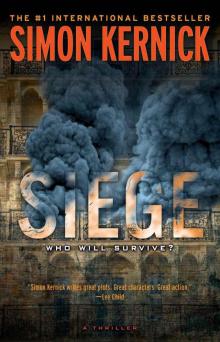 Siege: A Thriller
Siege: A Thriller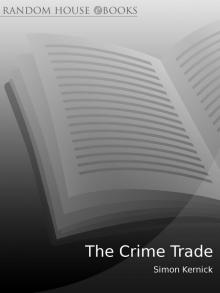 The Crime Trade
The Crime Trade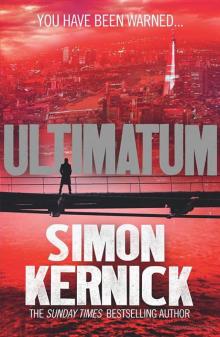 Ultimatum
Ultimatum